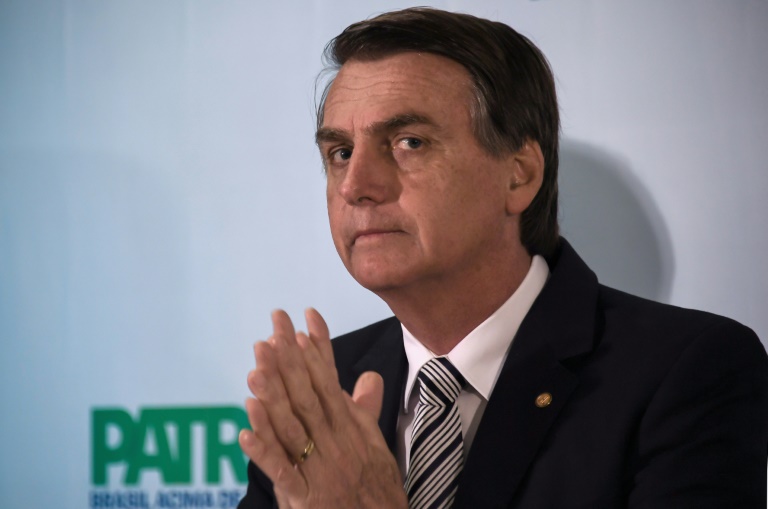Seven secrets to better female orgasms – expert
To say no one knows who will win Brazil's presidential election in 12 months is an understatement. No one even knows who the candidates will be -- or if the frontrunner will be in jail.
The race is the most wide open in many years as Brazil stumbles through a stunning combination of corruption scandals, economic upheaval and polarized politics.
President Michel Temer won’t be seeking reelection and as Brazil’s most unpopular leader on record, he’ll have little sway over his successor. So who’ll take the prize?
According to multiple opinion polls, the surprise leader by a runaway margin is 71-year-old former leftist president Luiz Inacio Lula da Silva. He was loved through much of his 2003-2010 rule, but has since seen many of his policies rolled back in right-leaning reforms and, worse, been convicted of corruption.
Lula’s appealing a sentence of nearly 10 years in prison.
If he loses, Lula will likely be jailed or at least barred from seeking office. But that decision might take months, sowing uncertainty deep into the election cycle.
Even if he wins, there are six other corruption trials pending.
Still, a Datafolha poll last week showed Lula topping several matchups in a first round on October 7, 2018, with about 35 to 36 percent. He’d then win any likely runoff, which is set for three weeks later.

Deputy and rightwing firebrand Jair Bolsonaro is positioned for a run for Brazil’s presidency, in the mold of Donald Trump
In second place is another surprise: rightwing firebrand Jair Bolsonaro.
Long considered a marginal figure because of his admiration for Brazil’s old dictatorship and his sexist, homophobic and racist outbursts, Bolsonaro is riding high. Datafolha showed him winning 16 to 18 percent of the vote in a first round.
Just behind Bolsonaro in most scenarios is former environment minister Marina Silva, although she’d benefit from Lula being out of the picture. Following her at some distance are several, so-far underwhelming centrist candidates.
– Rage for change –
The only sure thing, analysts say, is voters’ rebellious mood.
Sao Paulo Governor Geraldo Alckmin, seen here standing behind Brazil’s President Michel Temer (R), would face a rebellious electorate if he runs for president next year
The lead centrist candidate is Sao Paulo Governor Geraldo Alckmin, from the PSDB social democrats, one of Brazil’s biggest parties.
Normally, he’d be in a strong position, but he lags in the polls. As a typical establishment favorite, he’s seen by analysts as Brazil’s Hillary Clinton — maybe the right person but competing at the wrong time.
Bolsonaro’s rise indicates thirst for a local Donald Trump claiming he’ll drain the swamp of corruption uncovered in Brazil’s mammoth “Car Wash” investigation” and put the floundering economy back on its feet.
“He is tapping into a deep discontent in the electorate that is unlikely to dissipate much even if the economy recovers next year,” Eurasia Group analysts say.
Another outsider, but far less radical, would be Joao Doria, who shot to political signficance with a surprise first round victory in Sao Paulo’s mayoral election last year.
Like Bolsonaro, Doria has been likened by some to Trump. The mayor is a millionaire non-politician who hosted the game show “The Apprentice.”
But Doria’s problem is that he’s also from the PSDB and currently behind Alckmin in the pecking order for being made the party’s candidate. He might switch party and try to cause another upset.
– ‘No answers’ –
Ultimately, the game depends hugely on Lula’s fate.
Ciro Gomes, a former finance minister and governor of the northeastern state of Ceara, is one of the few contenders for the Brazilian presidency who remains untainted by corruption scandals
“Everyone’s afraid of his candidacy,” Michael Mohallem, a law professor at the Getulio Vargas Foundation in Rio de Janeiro.
Lula being removed would open the door to a far less divisive figure from the left, Ciro Gomes, who served as a minister under Lula and was a popular governor in the northeastern state of Ceara. Crucially, Gomes is one of the few potential contenders who remains untainted by the “Car Wash” scandals.
“He was a mainstream politician but was not in office for 10 years, so (‘Car Wash’) didn’t reach him. As a mainstream politician with name recognition who hasn’t been accused, that’s automatically strong,” Mohallem said.
Where the list of candidates could really get unpredictable is if the Supreme Court allows independent candidates, ending the current requirement for mainstream party affiliation.
That could bring in hugely popular true outsiders. In fantasy politics, many Brazilians would like to see crusading anti-corruption Judge Sergio Moro run for office or even successful national football team coach Tite.
“We have a lot of questions,” says Sylvio Costa, editor of the specialist website Congresso em Foco. “But we have no answers.”
Download our app